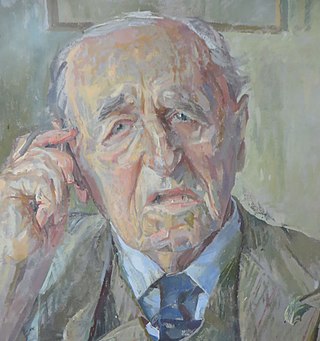Related Research Articles
Barbara M. Levick is a British historian and epigrapher, focusing particularly on the Late Roman Republic and Early Empire. She is recognised within her field as one of the leading Roman historians of her generation.

John Lewis Gaddis is an American international relations scholar, military historian, and writer. He is the Robert A. Lovett Professor of Military and Naval History at Yale University. He is best known for his work on the Cold War and grand strategy, and he has been hailed as the "Dean of Cold War Historians" by The New York Times. Gaddis is also the official biographer of the seminal 20th-century American statesman George F. Kennan. George F. Kennan: An American Life (2011), his biography of Kennan, won the 2012 Pulitzer Prize for Biography or Autobiography.

The Dreros inscription is the earliest surviving inscribed law from ancient Greece. It was discovered in Dreros, an ancient settlement on the island of Crete, in 1936, and first published by Pierre Demargne and Henri van Effenterre in 1937.
Eucleides was archon of Athens towards the end of the fifth century BC. He contributed towards the re-establishment of democracy during his years in office. He is also believed to have contributed to the new political order, with proposals that sought to deal with the challenge of the potentially disruptive minority who had supported oligarchy in the previous years.

Martin Litchfield West, was a British philologist and classical scholar. In recognition of his contribution to scholarship, he was awarded the Order of Merit in 2014.
Victor Ehrenberg was a German Jewish historian.
Lucius Gellius Poplicola or Publicola was a Roman senator who led a checkered political career during the civil wars of the late Republic. Initially a supporter of Julius Caesar's assassins, Brutus and Cassius, he defected to the Second Triumvirate and was later rewarded with a consulship, in 36 BC. Gellius fought for Mark Antony against Octavian at the Battle of Actium in 31 BC, after which he disappears from history.

Diotima of Mantinea is the name or pseudonym of an ancient Greek character in Plato's dialogue Symposium, possibly an actual historical figure, indicated as having lived circa 440 B.C. Her ideas and doctrine of Eros as reported by the character of Socrates in the dialogue are the origin of the concept today known as Platonic love.
Robin Grimsey Osborne, is an English historian of classical antiquity, who is particularly interested in Ancient Greece.

Diagoras of Rhodes was an Ancient Greek boxer from the 5th century BC, who was celebrated for his own victories, as well as the victories of his sons and grandsons. He was a member of the Eratidea family at Ialysos in Rhodes.
Epigonus of Thessalonica is an epigrammatist quoted in the Greek Anthology. Both the Palatine and Planudean codices attribute AP 9.261, an epigram on an ageing vine, to Epigonus; the Planudean codex attributes two more poems to him.

Philip A. G. Sabin is a British military historian who is currently Professor of Strategic Studies in the War Studies Department of King's College London.
Nick Lowe is a British classical scholar and film critic.

George Law Cawkwell was a classical scholar who specialised in the ancient history of Greece in the 4th century BC.
Armand D'Angour is a British classical scholar and classical musician, Professor of Classics at Oxford University and Fellow and Tutor in Classics at Jesus College, Oxford. His research embraces a wide range of areas across ancient Greek culture, and has resulted in publications that contribute to scholarship on ancient Greek music and metre, innovation in ancient Greece, Latin and Greek lyric poetry, the biography of Socrates and the status of Aspasia of Miletus. He writes poetry in ancient Greek and Latin, and was commissioned to compose odes in ancient Greek verse for the 2004 and 2012 Olympic Games.

De verborum significatione libri XX, also known as the Lexicon of Festus, is an epitome compiled, edited, and annotated by Sextus Pompeius Festus from the encyclopedic works of Verrius Flaccus. Festus' epitome is typically dated to the 2nd century, but the work only survives in an incomplete 11th-century manuscript and copies of its own separate epitome.
Projet Volterra is a European project of ancient legal history databases of the Institute of Classical Studies and elsewhere.
Esther Eidinow is a British ancient historian and academic. She specialises in ancient Greece, particularly ancient Greek religion and magic. She has been Professor of Ancient History at the University of Bristol since 2017.

Christopher Allan Stray is a British historian of classical scholarship and teaching.

Maria Millington Lathbury was a classical scholar, archaeologist and numismatist. An alumna of Somerville College, she campaigned for Oxford University to award degrees to women. Along with Ethel Abrahams, she was one of the first female scholars of classical Greek dress. She married the archaeologist John Evans, and their daughter was the art historian Joan Evans.
References
- ↑ Williams, Lisa (1990). The Grant Register, 1991-1993. London: Macmillan. p. 342.
- ↑ https://ics.sas.ac.uk/awards/award-prizes Archived 8 December 2021 at the Wayback Machine The Institute of Classical Studies: Awards and Prizes. Retrieved 29 April 2019.
- ↑ "George Grote Prize in Ancient History". Gnomon. 54 (3): 320. 1982. JSTOR 27688096.
- ↑ Osborne, Robin. Demos: The Discovery of Classical Attika. Cambridge: Cambridge University Press. p. xii and 15-42.
- ↑ d'Angour, Armand J. (1999). "Archinus, Eucleides and the Reform of the Athenian Alphabet". Bulletin of the Institute of Classical Studies. 43: 109–130. doi:10.1111/j.2041-5370.1999.tb00481.x. JSTOR 43646755.
- ↑ Crowther, Charles (1995). "Iasos in the Second Century Bc III: Foreign Judges from Priene". Bulletin of the Institute of Classical Studies. 40: 91–138. doi:10.1111/j.2041-5370.1995.tb00467.x.